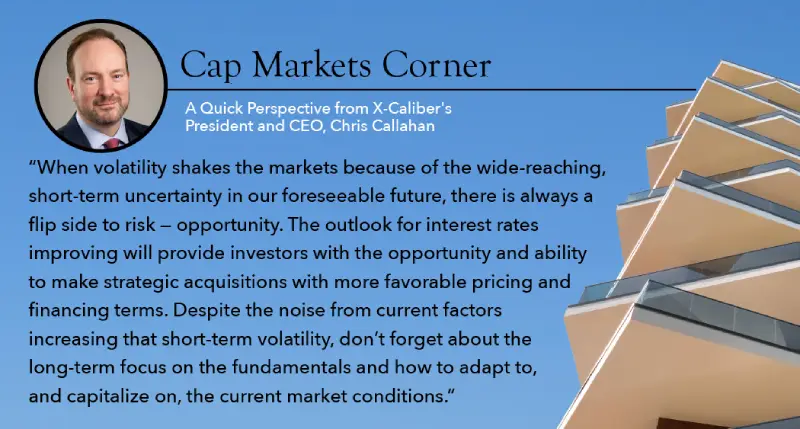X-Caliber August 2024 Market Movers
Capital Market Matters: Markets Rattle
Markets have been shaken over the last week. Consumer confidence was stronger than expected but the Institute of Supply Management’s Chicago Business Barometer dropped in July after June’s first increase since November 2023. The ISM also said manufacturing activity expanded; however, factory orders were down 3.3% rather than 3.2%. July saw 114,000 new jobs rather than the expected 185,000, with unemployment jumping to 4.3% from 4.1%. Investors were shaken. And then the carry trade — financial arbitrage of borrowing in low-interest-rate markets like Japan and investing where interest is higher — took a hit when the Bank of Japan raised interest rates to 0.25%, the highest in many years. Many investors had to cover trade positions. The S&P 500, Dow Jones Industrials, and Nasdaq equity composites dropped about 8%, 6.5%, and 18.1% respectively by July 7. But the Treasury 10-year yield neared 4% again and SOFR, at 5.33%, is around May’s levels, meaning baseline rates in CRE borrowing aren’t far off what they just were.
Wharton professor emeritus Jeremy Siegel told CNBC’s “Squawk Box” that the Federal Reserve should make an emergency 75-basis point cut to the federal funds rate now and another in September. He pointed to Fed statements that 4.1% unemployment and 2% inflation should mean a 2.8% federal funds rate. Inflation is 90% of the way to that target and unemployment is already over 4.1%, but there’s been no reduction from the current 5.25%-to-5.50% interest rate range. Nobel laureate Paul Krugman, who had argued for a 50-basis point cut in September, said there’s now a “real case for an emergency cut soon.”
But have some patience, said Goldman Sachs Economics Research in a client note including its new Financial Stress Index. Despite everything, conditions have remained at a “relatively normal level by historical standards.”
“So, while market stress is noticeably higher than a week ago, our FSI suggests that there have been no serious market disruptions to date that would force policymakers to intervene,” they added.
CRE Insights: Uncertainty Through November and Beyond
Markets do not like uncertainty, and there could be a lot over the next few months. The upcoming U.S. election in early November, questions about a potential recession, what the Fed might do with interest rates, shifts in the carry trade and global investments, geopolitical conflict – all of this and more provides a level of uncertainty and risk.
Each of these categories can have a short-term impact on CRE, and a presidential election might seem to be top of the list. The upcoming election results may influence fiscal and regulatory policies affecting commercial real estate. Volatility in the short run can be an inconvenience — even a significant one.
However, regardless of the election outcome, history suggests market fundamentals and the macroeconomy have the greatest influence. CRE is more affected by rate changes and macroeconomic conditions than by who is president — or what complex global financing or geopolitical conflicts take place.
On the Horizon: Policy Proposals to Watch
When consumers — meaning voters — complain loudly enough, politicians react. That’s happening now on multiple fronts when it comes to apartment renters. The Biden administration has made moves in the area. One from January was a “renter’s bill of rights” that would, among other things, more strictly control how evictions could happen (like a vague “just- or good-cause evictions” requirement). In June, the Federal Housing Finance Agency requested input as a first step to protections that Freddie Mac and Fannie Mae could require from borrowers seeking multifamily mortgages.
Things continue to expand at the federal, state, and local levels. Last month, President Biden called on Congress to limit rental increases on units held by corporate landlords, with more than 50 units, to 5% a year or risk losing faster depreciation tax write-offs. The plan supposedly would last for two years only with exceptions for new construction or substantial renovation projects. There is little to no chance of such a bill passing the current Congress. However, it shows some of the political pressure mounting.
More practical implications come at the state and local levels. Another attempt at lifting state-wide rent control restrictions in California is coming in the form of Proposition 33. If passed, the ballot measure would repeal the Costa-Hawkins Rental Housing Act that prohibits rent control on single-family homes and housing units built after 1995. San Francisco’s Board of Supervisors passed a provision that prohibits the use of revenue management software that helps landlords set rent prices. Such an attempt failed in Colorado earlier this year, but that is still a reminder for property owners to watch legislation.




